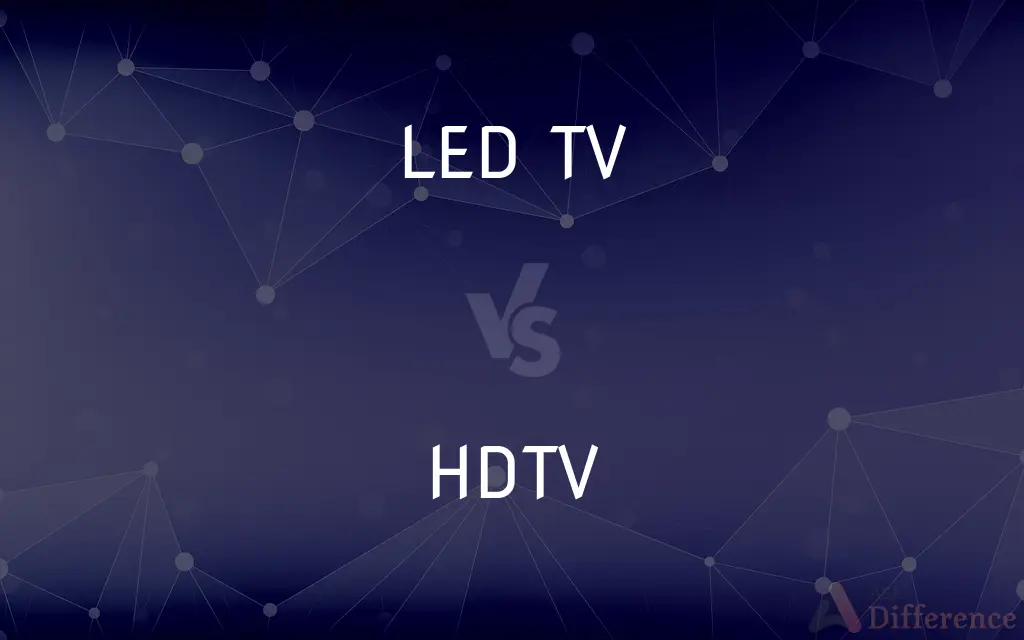LED TV vs. HDTV — What's the Difference?
By Tayyaba Rehman & Fiza Rafique — Published on February 1, 2024
LED TV refers to the backlight technology using Light Emitting Diodes, while HDTV is a resolution standard indicating High Definition Television.

Difference Between LED TV and HDTV
Table of Contents
ADVERTISEMENT
Key Differences
LED TV refers to the type of display technology used, where Light Emitting Diodes (LEDs) backlight the screen. This technology allows for thinner screens, better energy efficiency, and improved picture quality. On the other hand, HDTV, which stands for High Definition Television, is a resolution quality standard. HDTVs offer higher resolution than standard definition televisions, resulting in clearer and more detailed images. The distinction is crucial; LED TVs can be HDTVs if they meet the resolution criteria.
When discussing LED TVs, the focus is primarily on the backlighting technology. This technology enhances color contrast and brightness, contributing to a more vibrant and dynamic picture. Contrastingly, HDTV is a term that denotes the resolution of the television, specifically 720p, 1080i, or 1080p. These numbers indicate the number of horizontal lines of resolution, which is a measure of image clarity and detail.
LED TVs are known for their longevity and lower power consumption compared to other types of televisions, such as LCD or plasma TVs. This makes them a popular choice for consumers. HDTV, on the other hand, doesn't refer to the technology behind the screen but rather to the broadcast format that enhances the viewing experience with superior image quality compared to standard definition.
The market for LED TVs has grown significantly, offering various sizes and features. These TVs are available in both standard definition and high definition versions. In contrast, HDTV represents a universal resolution standard that can be applied to any type of television technology, including LED, LCD, and plasma. Thus, an HDTV could be an LED TV if it uses LED backlighting technology.
In summary, LED TV and HDTV serve different functions in the realm of television technology. While LED TV pertains to the specific technology used for display backlighting, HDTV is a broader term that specifies the resolution quality of the television, irrespective of the underlying display technology.
ADVERTISEMENT
Comparison Chart
Definition
Refers to the backlight technology using LEDs.
Refers to the resolution standard, typically 720p or higher.
Image Quality
Enhanced by LED backlighting for better contrast and color.
Defined by the number of pixels, resulting in higher clarity.
Energy Efficiency
Generally more energy-efficient due to LED usage.
Efficiency depends on the type of display, not the resolution.
Lifespan
Tends to have a longer lifespan.
Lifespan varies based on the display technology used.
Price Range
Can vary, often higher for advanced LED models.
Dependent on the resolution and the technology of the screen.
Compare with Definitions
LED TV
A TV display technology known for its ability to produce deep blacks and high contrast ratios.
The horror movie was even more intense on our LED TV because of its deep black levels.
HDTV
A television broadcasting format providing a detailed and crisp image.
The news anchor's features are so clear on our new HDTV.
LED TV
A modern television technology featuring LEDs for brighter and more dynamic images.
The wildlife documentary looked stunningly realistic on our high-definition LED TV.
HDTV
A TV with a high pixel density for enhanced picture sharpness.
Nature documentaries look exceptionally vivid on our HDTV.
LED TV
A television that utilizes Light Emitting Diodes for backlighting.
The LED TV in my living room provides a crystal-clear image due to its advanced backlighting.
HDTV
A television standard offering resolutions of 720p, 1080i, or 1080p.
Our HDTV's 1080p resolution makes movie nights an immersive experience.
LED TV
A slim and energy-efficient television model with LED-based backlight.
I chose an LED TV for its slim design and lower electricity consumption.
HDTV
High Definition Television with a resolution significantly higher than standard definition.
Watching sports on an HDTV feels almost like being at the game because of the clarity.
LED TV
A type of LCD TV enhanced with LED backlighting for improved picture quality.
Our new LED TV offers more vibrant colors compared to our old plasma screen.
HDTV
A digital television broadcasting system with superior image quality compared to standard TVs.
Once we switched to HDTV, our favorite sitcoms looked surprisingly more detailed.
HDTV
A television system that has more than the usual number of lines per frame so its pictures show more detail
Common Curiosities
Is the picture quality of an LED TV better than a regular HDTV?
LED TVs often have better contrast and color, but picture quality also depends on the resolution, which is defined by HDTV standards.
Are all LED TVs also HDTVs?
Not necessarily. While many LED TVs are HDTVs, some may have lower resolutions.
Can an HDTV use technologies other than LED?
Yes, HDTVs can use various technologies like LCD, plasma, or OLED.
What is an LED TV?
An LED TV is a type of LCD TV that uses Light Emitting Diodes for backlighting.
Is the installation process different for LED TVs and HDTVs?
Installation is generally similar, but LED TVs might be lighter and easier to mount.
What does HDTV stand for?
HDTV stands for High Definition Television, indicating a higher resolution than standard definition.
Are HDTVs more expensive than standard definition TVs?
Typically, yes, due to their higher resolution and improved image quality.
Can I watch standard definition content on an LED HDTV?
Yes, but it will be upscaled, potentially affecting image quality.
Can LED TVs display 4K resolution?
Yes, many modern LED TVs are capable of displaying 4K resolution.
Do LED TVs last longer than other HDTVs?
LED TVs often have a longer lifespan compared to other types of TVs.
Are HDTVs compatible with all gaming consoles?
Generally, yes, but for optimal performance, check the console's resolution compatibility.
Do LED TVs consume more power than HDTVs?
LED TVs are generally more energy-efficient than other types, but power consumption in HDTVs varies based on the technology used.
Do LED TVs offer better viewing angles than standard HDTVs?
This depends on the specific model and technology; some LED TVs have better viewing angles.
Are all HDTVs flat-screen?
Most modern HDTVs are flat-screen, but the technology is not limited to this design.
Is it worth upgrading to an LED HDTV from a standard definition TV?
For improved picture quality and energy efficiency, upgrading to an LED HDTV is often worth it.
Share Your Discovery

Previous Comparison
.357 Magnum vs. .38 Special
Next Comparison
Delete vs. Shift DeleteAuthor Spotlight
Written by
Tayyaba RehmanTayyaba Rehman is a distinguished writer, currently serving as a primary contributor to askdifference.com. As a researcher in semantics and etymology, Tayyaba's passion for the complexity of languages and their distinctions has found a perfect home on the platform. Tayyaba delves into the intricacies of language, distinguishing between commonly confused words and phrases, thereby providing clarity for readers worldwide.
Co-written by
Fiza RafiqueFiza Rafique is a skilled content writer at AskDifference.com, where she meticulously refines and enhances written pieces. Drawing from her vast editorial expertise, Fiza ensures clarity, accuracy, and precision in every article. Passionate about language, she continually seeks to elevate the quality of content for readers worldwide.
















































